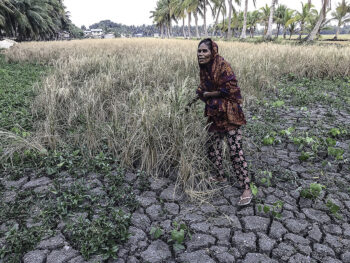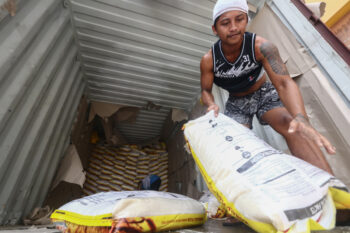1st of 2 parts
DAVAO CITY (MindaNews / 4 Feb) – “The Promising Future of the Teduray and Lambangian is up in the air,” lamented Victoria “Vicky” Tauli-Corpuz, the United Nations Special Rapporteur on the Rights of Indigenous Peoples (UNSRRIP), after meeting last Wednesday January 21 with Leaders from the Teduray, Dulangan Manobo, Lambangian and Erumanen ne Manobo communities that are either partially or fully included in the proposed Bangsamoro Territory.
Mrs. Tauli-Copuz, as head of the UN body mandated to monitor the concerns of IPs around the world, came to Mindanao after a surge of killings of IP leaders in the Autonomous Region of Muslim Mindanao (ARMM) between May and December of last year. She was joined by Edtami Mansayagan, the Asia Pacific Representative to the UN Expert Mechanism on the Rights of Indigenous Peoples (EMRIP), himself an Erumanen ne Menuvu of North Cotabato. Mrs. Tauli-Corpuz is an Igorot hailing from Bagiou City and is the first Filipino to be appointed to the United Nations top post and mandated to defend the rights of tribal communities as defined in the UN Declaration on the Rights of Indigenous Peoples (UNDRIP).
Amidst the backdrop of the Mamasapano debacle, Indigenous People’s (IP) leaders allege that they have been systematically targeted and assassinated, and consequently, they have engaged in a series of open fora to express their concern regarding these and other human rights violations. Following the UN Special Rapporteur’s consultation on January 21, the Ateneo de Davao Public Interest and Legal Advocacy (APILA) Center and Initiatives for International Dialogue (IID) held a Human Rights (HR) Stakeholders Dialogue with government duty-bearers, NGO support groups and international observers on January 30. The purpose of the “grassroots and duty-bearers interface” was to “generate concrete recommendations and policy actions to address the current gaps and challenges of the HR situation.”
The UN Envoys and other CSO groups were also responding to complaints from IP Leaders concerned about inclusion and protection of IP rights in the Bangsamoro Basic Law (BBL) that is currently under review in the Philippine Congress and Senate. Mr. Mansayagan, as Asia Pacific representative to the UN expert mechanism, expressed his belief that these murders and harassment are part of an ongoing concerted effort to intimidate and silence the IPs who assert their involvement in the peace process, especially as it relates to the protection of their Ancestral Domains. Additionally, Mrs. Tauli-Corpuz highlighted deficiencies in the draft BBL pertaining to Indigenous Peoples’ identity and Ancestral Domain, as well as in the inclusion of IPs in the community consultations for the law.
Ancestral Domain: Delineation Denied….
Assembled IP leaders provided details to the UN Rapporteur alleging that the Philippine Government, the MILF and the regional government of the Autonomous Region of Mindanao (ARMM) have deliberately blocked implementation of the Indigenous People’s Rights Act (IPRA) in the ARMM and excluded it from the proposed Bangsamoro Territory. They also presented evidence showing a pattern of backdoor deals in favor of mining interests and large scale investments in the ARMM. The ARMM Regional Board of Investments (RBOI) has noted a dramatic increase in direct investments in the territory over the last year, especially in power, mining and natural resources.
Timuay Alim Bandara is head claimant for the unified Teduray, Lambangian and Dulangan Manobo Ancestral Domain claim covering approximately 300,000 hectares in central Mindanao effected by potential large scale investments. He related how their application for a certificate of ancestral domain has been repeatedly delayed even though it pre-dates both the creation of the ARMM and the current Comprehensive Agreement on the Bangsamoro (CAB). He shared that their tribal council applied for a Certificate of Ancestral Domain Claim (CAD-C) prior to 1997 and a unified claim for Certificate of Ancestral Domain Title (CAD-T) in 2005, yet none of these tenurial applications have been realized.
Most recently, he noted that the Office for Southern Cultural Communities (OSCC), the local government agency tasked to implement IPRA in the ARMM, refused to proceed with the delineation of Ancestral Domain as mandated by law and affirmed by an en banc Resolution issued by the National Commission of Indigenous Peoples (NCIP) in January of 2013. According to Timuay Alim, the OSCC stated that they did not comply with the resolution in order not to disrupt the drafting of the Bangsamoro Basic Law. At the same time, the MILF has asserted in public statements that there will be only one Ancestral Domain, which is the soon to be established Bangsamoro. That’s why Luwaran, the official MILF website, noted “the ill-effects of subdividing the Bangsamoro territory on the basis of tribes and clans,” in an October 25, 2014 editorial. Thus, IPs find themselves in a lose-lose situation as far as delineation of their AD, facing obstruction from the current political regime and opposition from the incoming Bangsamoro political entity.
….while Investments Accelerate
According to Timuay Sannie Bello, the High Chief of the Teduray Tribe, even as the government and MILF obstructed the delineation of IP Ancestral Domain on one hand, the regional government facilitated the exploration of potential nickel ore in the sacred burial grounds of the Teduray in the Mount Fakal range. A fact finding mission conducted in late 2014 by Kilusang Maralita sa Kanayunan (KILOS KA) and the Legal Rights and Natural Resources Center (LRC-KsK/FOE Phils.) found that illegal mining exploration took place in the ancestral domain of the Teduray and Lambangian in North Upi and Datu Blah Sinsuat between April 23 and September 5, 2014. Helicopters of the provincial government of Governor Toto Mangudadatu ferried armed men and mining engineers to take soil samples from multiple locations in the two municipalities. They did this without obtaining a permit from the regional Department of Environment and Natural Resources (DENR) nor the Free Prior and Informed Consent (FPIC) of the Teduray governing tribal council.
Additionally, according to the fact finding report distributed at the Ateneo Human Rights Forum, a combined force of MILF, MNLF, AFP and CAFGU accompanied the mining exploration teams, intimidating local officials and causing apprehension for local residents. This occurred despite the MILF’s several calls to investors in September and December of 2014 for sobriety and restraint, stating, “for development to be truly genuine and appreciated it must anchor on true moral values, people-focused or centered, and is caring for the environment. In no way it should become development aggression, which results in massive displacement of people, especially members of the marginalized sectors of society, including the indigenous peoples.”
[To be continued.]
(MindaViews is the opinion section of MindaNews. Jeremy Simons is currently Director of Training at iEmergence Inc., a peacebuilding volunteer with several Mindanao peace networks, and a writer and analyst based in Davao City. He can be reached at justpeaceadvocate@gmail.com.)






